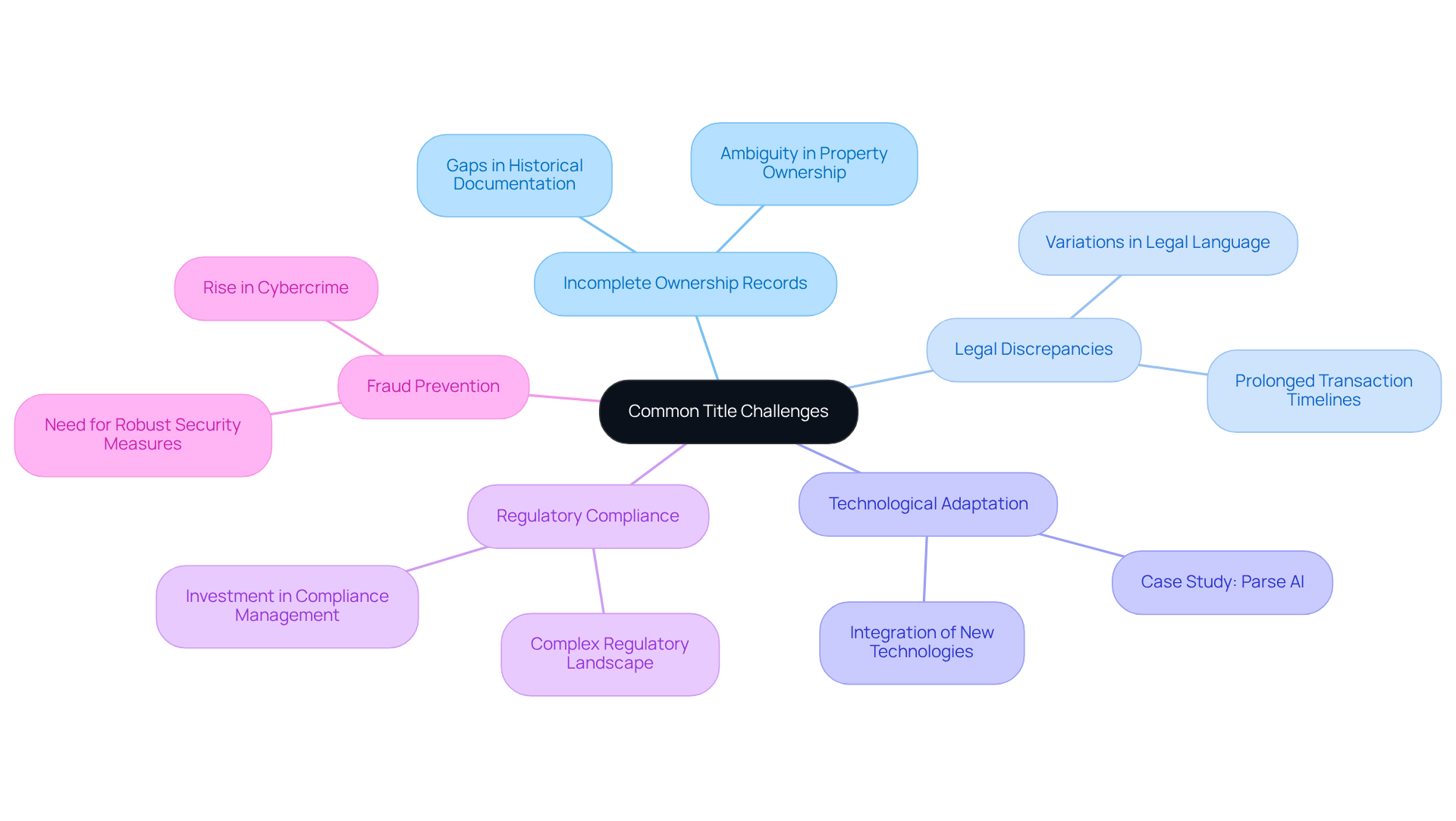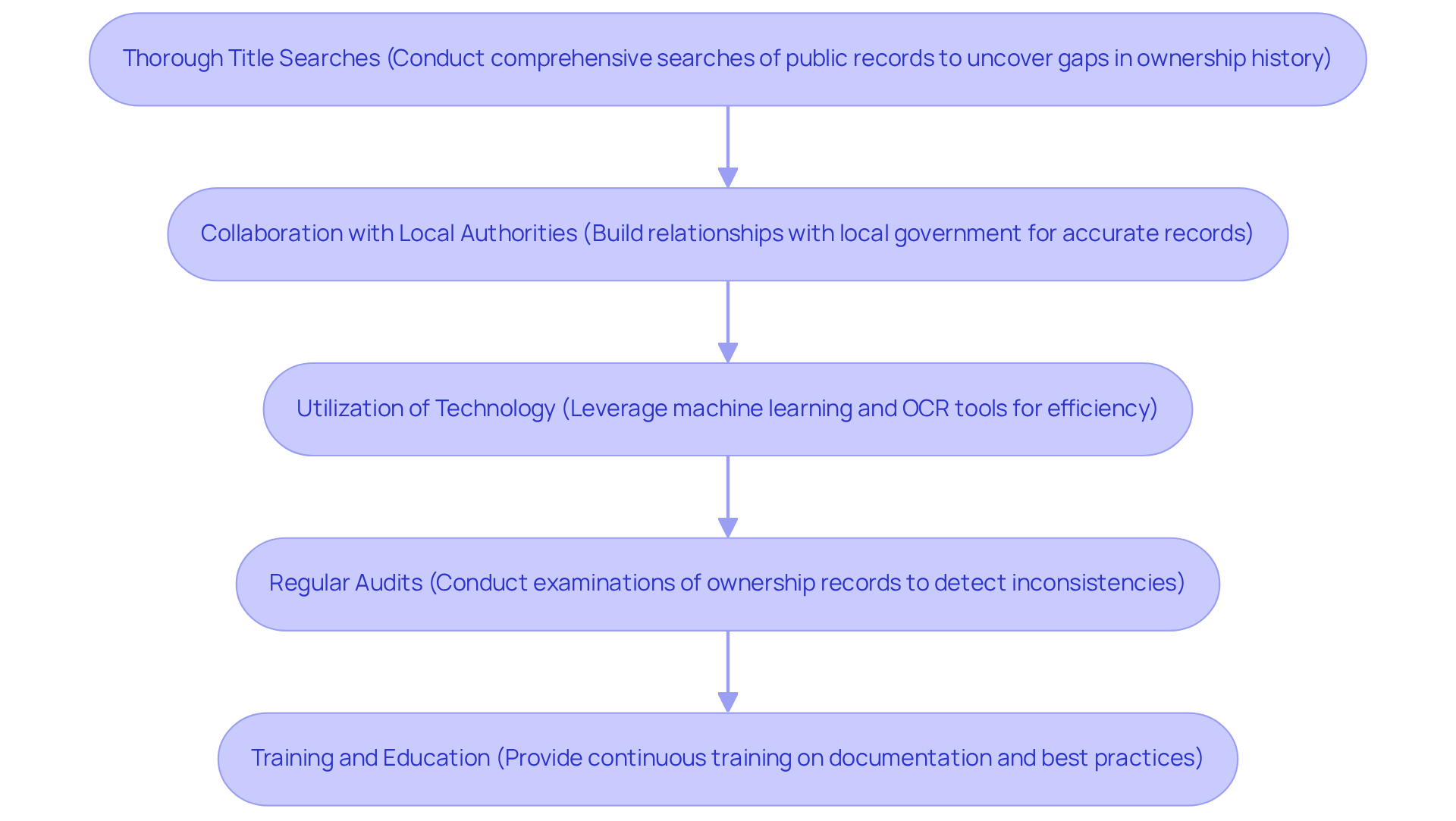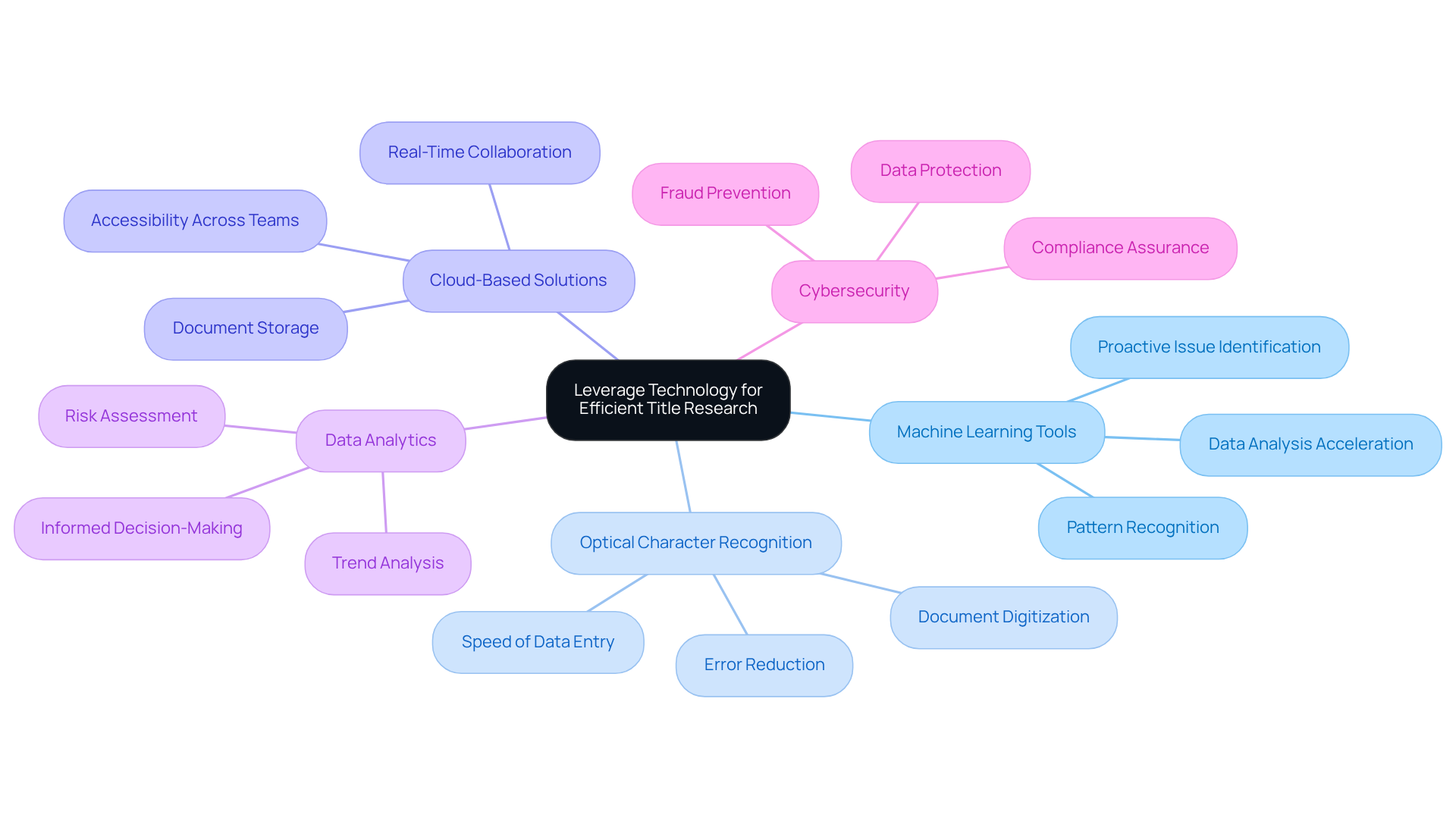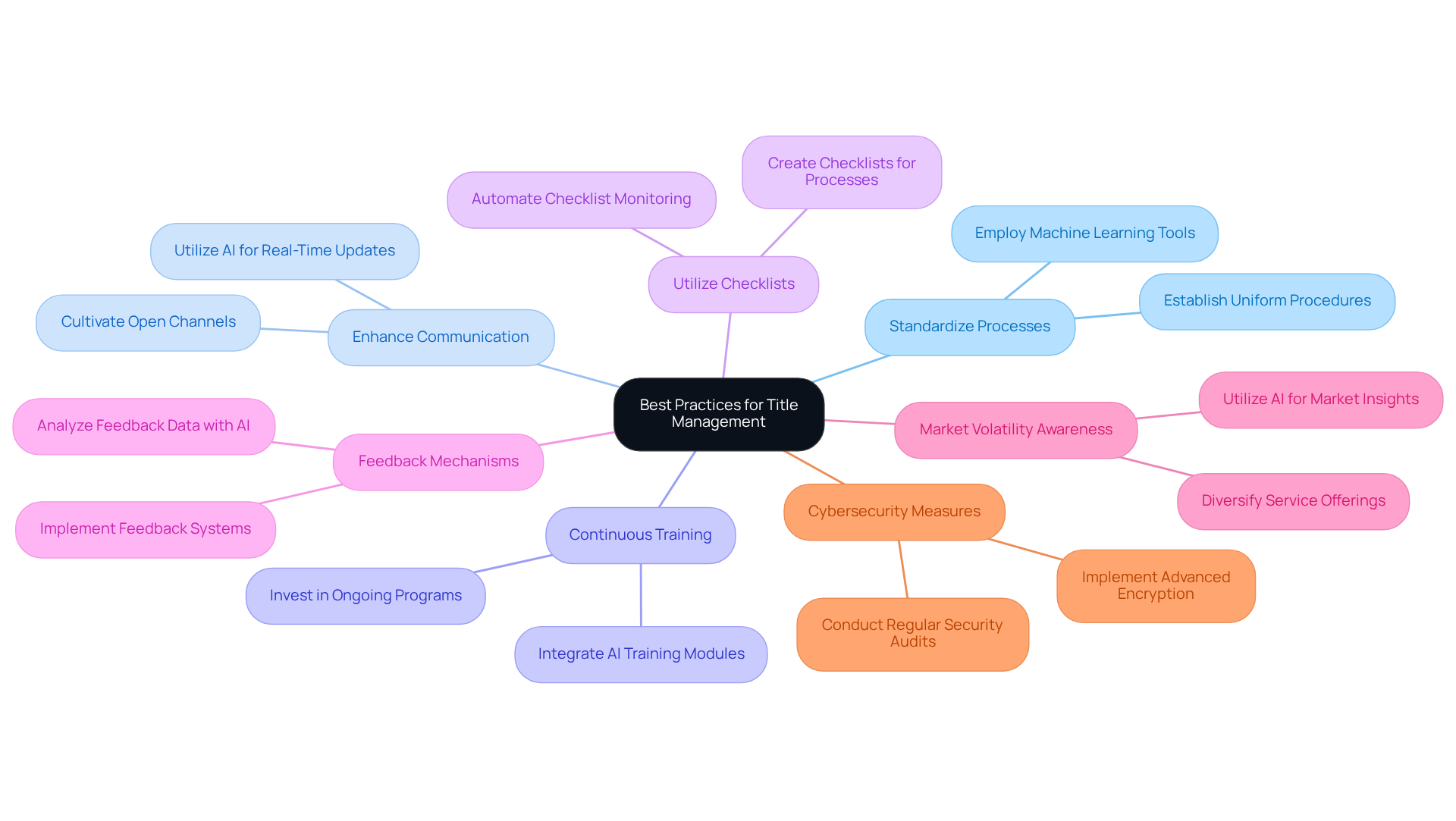Overview
The article discusses the significant challenges encountered by title companies, such as:
- Incomplete ownership records
- Legal discrepancies
- Technological adaptation
- Regulatory compliance
- Fraud prevention
It proposes actionable solutions aimed at enhancing operational efficiency. Emphasizing the critical nature of thorough title searches, the article advocates for:
- Collaboration with local authorities
- Leveraging of technology
- Regular audits
- Continuous training
These strategies are essential for mitigating challenges and improving service reliability.
Introduction
Title companies play a pivotal role in the real estate industry, yet they frequently encounter a myriad of challenges that can hinder their efficiency and accuracy. These challenges, ranging from incomplete ownership records to the complexities of regulatory compliance, not only disrupt operational workflows but also jeopardize client trust. This article explores the common obstacles faced by title firms and presents strategic solutions designed to enhance their capabilities.
How can title companies effectively navigate these persistent challenges while ensuring robust service delivery and safeguarding client interests?
Identify Common Title Challenges
Title firms encounter common challenges for title companies that significantly impact their operational efficiency and precision. Understanding these key issues is crucial for firms as they navigate the common challenges for title companies while aiming to enhance their capabilities and protect their clients' interests.
- Incomplete or Inconsistent Ownership Records: A considerable number of record firms grapple with gaps in historical documentation, leading to ambiguity regarding property ownership. Although specific statistics on incomplete records are not available, it is widely acknowledged that these gaps complicate the verification process, ultimately hindering operational effectiveness.
- Legal Discrepancies: Variations in legal language and interpretations can create confusion and disputes over property rights. Such inconsistencies often result in prolonged transaction timelines and increased costs for all parties involved. Industry experts emphasize the necessity of clarity in legal documentation to mitigate these risks.
- Technological Adaptation: As the industry increasingly embraces digital solutions, many companies encounter difficulties in integrating new technologies into their existing workflows. A case study of Parse AI illustrates how machine learning and optical character recognition can enhance the extraction of vital information from document titles. This advancement allows researchers to finalize abstracts and reports more effectively, addressing the challenges posed by technological adaptation.
- Regulatory Compliance: The real estate sector faces a complex regulatory landscape with ongoing changes in property laws and compliance requirements. Firms must invest substantially in compliance management systems and staff training to navigate these evolving regulations successfully.
- Fraud Prevention: The rise in and deceitful actions presents significant threats to real estate firms. With the average cost of ownership and settlement services in the U.S. estimated at $1,900, robust security measures are essential to safeguard sensitive client information and uphold trust. Fraud not only escalates operational expenses but also jeopardizes client relationships and the organization's reputation.
Recognizing the common challenges for title companies is essential for firms seeking to implement effective solutions that enhance their operational capabilities and protect their clients' interests.

Address Documentation and Ownership Discrepancies
To effectively address documentation and ownership discrepancies, title companies must implement the following strategies:
- Thorough Title Searches: Conducting comprehensive searches of public records is essential to uncover gaps or inconsistencies in ownership history. This diligence is vital, as comprehensive ownership searches significantly reduce risks related to property transactions.
- Collaboration with Local Authorities: Building robust relationships with is crucial for accessing accurate and up-to-date records. Companies that promote collaborative working are five times more likely to be high performing, underscoring the importance of such partnerships. This collaboration not only enhances the precision of document searches but also fosters trust, which is essential for efficient communication and problem-solving. As Stephen R. Covey noted, "When the trust account is high, communication is easy, instant, and effective."
- Utilization of Technology: Leveraging machine learning and optical character recognition tools can streamline the extraction and verification of document titles. Parse AI exemplifies this innovation by enabling researchers to finalize abstracts and reports more swiftly and accurately, resulting in significant cost reductions compared to conventional methods. By adopting advanced technologies, firms can enhance efficiency and precision in their workflows.
- Regular Audits: Conducting regular examinations of ownership records allows firms to proactively detect and correct inconsistencies. This practice not only ensures adherence but also strengthens the reliability of service offerings.
- Training and Education: Providing continuous training for personnel on the importance of precise documentation and the latest best practices in research is essential. A knowledgeable team is better equipped to navigate the complexities of document searches and uphold high standards of accuracy. Moreover, enhancing training programs to include collaboration and communication skills can significantly improve team dynamics and overall effectiveness.
By adopting these strategies, firms can substantially reduce the likelihood of errors and enhance the reliability of their services, which can help overcome common challenges for title companies, ultimately benefiting all parties involved in property transactions.

Leverage Technology for Efficient Title Research
To leverage technology effectively in title research, companies must consider several strategic approaches:
- Adopt Machine Learning Tools: By utilizing machine learning algorithms, organizations can analyze extensive datasets and identify patterns that significantly accelerate the research process.
- Implement Optical Character Recognition: Employing OCR technology allows for the conversion of scanned documents into editable and searchable formats, thereby facilitating the extraction of relevant information.
- Integrate Cloud-Based Solutions: Utilizing cloud-based platforms for document storage and collaboration enables real-time access and updates across teams, enhancing overall efficiency.
- Utilize Data Analytics: The implementation of provides valuable insights into name trends and potential risks, empowering proactive decision-making.
- Invest in Cybersecurity: Establishing robust cybersecurity measures is essential to safeguarding sensitive data against breaches and fraud.
By adopting these technological innovations, firms can not only improve their operational efficiency but also deliver superior service to their clients.

Implement Best Practices for Title Management
To implement best practices for title management, companies must focus on several key areas:
- Standardize Processes: Establish uniform procedures for document searches, documentation, and reporting to guarantee consistency and accuracy. This standardization is essential as it reduces errors, which helps to overcome common challenges for title companies and enhances the reliability of service offerings. Furthermore, employing advanced machine learning tools from another provider can streamline these processes, allowing for quicker and more precise document interpretation.
- Enhance Communication: Cultivate open communication channels among team members and with clients to address issues promptly and collaboratively. Effective communication is crucial for overcoming common challenges for title companies, as it helps establish trust and ensures that all parties are aligned throughout the process. The AI's tools can assist this by offering real-time updates and insights, ensuring everyone remains informed and engaged.
- Continuous Training: Invest in ongoing training programs for staff to keep them informed about industry changes and best practices. This commitment to education not only improves individual performance but also helps the organization better navigate the common challenges for title companies. Integrating Parse AI's training modules can significantly enhance staff comprehension of machine learning applications in title management.
- Utilize Checklists: Create checklists for each phase of the process to ensure that all required steps are completed and documented. Checklists serve as valuable instruments for ensuring thoroughness and accountability in overcoming common challenges for title companies. Consequently, can automate checklist creation and monitoring, ensuring compliance and minimizing oversight.
- Feedback Mechanisms: Implement feedback systems to gather insights from clients and staff, facilitating continuous enhancement of management practices. Regular feedback helps identify the common challenges for title companies and fosters a culture of responsiveness and adaptability. The AI can analyze feedback data to provide actionable insights for enhancement.
- Given the increasing sophistication of cyber threats, addressing common challenges for title companies is essential, which includes implementing robust cybersecurity measures such as advanced encryption, multi-factor authentication, and regular security audits to protect sensitive information. Parse AI's security features can help safeguard data integrity and confidentiality.
- Market Volatility Awareness: Title firms should also be aware of market volatility, which can significantly impact transaction volumes and revenue. By diversifying offerings and concentrating on customer care, businesses can better manage the common challenges for title companies that arise during these fluctuations. AI's analytics tools can deliver market insights to assist organizations in adapting to evolving circumstances.
By implementing these best practices, including leveraging Parse AI's automated document processing and machine learning extraction capabilities, title companies can enhance their operational efficiency and provide reliable services to their clients, ultimately navigating the complexities of the evolving title industry.

Conclusion
Understanding the common challenges faced by title companies is essential for enhancing operational efficiency and ensuring client satisfaction. By addressing issues such as:
- Incomplete ownership records
- Legal discrepancies
- Technological adaptation
- Regulatory compliance
- Fraud prevention
firms can significantly improve their service offerings and protect their clients' interests.
Key strategies include:
- Conducting thorough title searches
- Fostering collaboration with local authorities
- Leveraging advanced technologies like machine learning and optical character recognition
- Implementing robust training programs for staff
These measures not only mitigate risks associated with property transactions but also streamline processes, enhance accuracy, and build trust among stakeholders.
Ultimately, embracing these best practices and technological innovations positions title companies to navigate the complexities of the industry effectively. By prioritizing operational excellence and client security, firms can adapt to market fluctuations and safeguard their reputation, ensuring continued success in an evolving landscape.
Frequently Asked Questions
What are the common challenges faced by title companies?
Title companies encounter challenges such as incomplete or inconsistent ownership records, legal discrepancies, technological adaptation issues, regulatory compliance complexities, and fraud prevention concerns.
How do incomplete or inconsistent ownership records affect title companies?
Incomplete or inconsistent ownership records create ambiguity regarding property ownership, complicating the verification process and hindering operational effectiveness.
What impact do legal discrepancies have on property transactions?
Legal discrepancies can lead to confusion and disputes over property rights, resulting in prolonged transaction timelines and increased costs for all parties involved.
What challenges do title companies face with technological adaptation?
Many title companies struggle to integrate new digital technologies into their existing workflows, which can impede their operational efficiency.
How can technology improve the operations of title companies?
Technologies such as machine learning and optical character recognition can enhance the extraction of vital information from document titles, allowing for more effective finalization of abstracts and reports.
What is the significance of regulatory compliance for title companies?
Title companies must navigate a complex regulatory landscape with changing property laws, requiring substantial investment in compliance management systems and staff training.
What threats does fraud pose to title companies?
The rise in cybercrime and deceitful actions threatens real estate firms by increasing operational expenses and jeopardizing client relationships and the firm's reputation.
Why is it important for title companies to recognize these common challenges?
Recognizing these challenges is essential for title companies to implement effective solutions that enhance their operational capabilities and protect their clients' interests.




